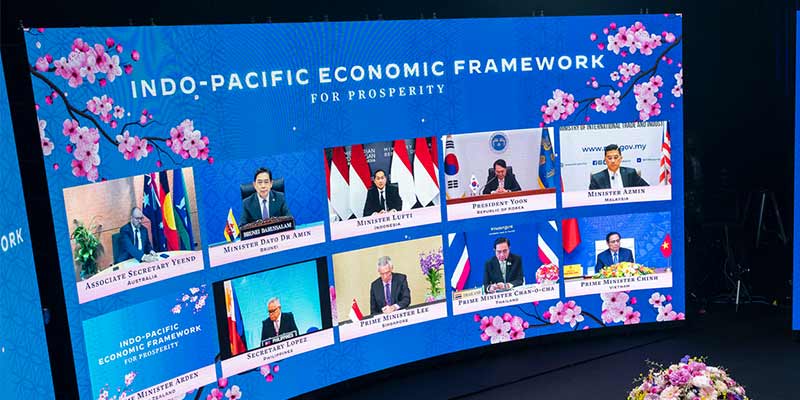- India
- Mar 17
Explainer - Four pillars of IPEF
• Union Minister Piyush Goyal participated in the virtual ministerial meeting Indo-Pacific Economic Framework for Prosperity (IPEF).
• The IPEF framework is structured around four pillars relating to trade, supply chains, clean economy and fair economy. India has joined all the pillars except the trade.
• During the meeting, the IPEF partners welcomed the significant progress made since the substantial conclusion of the negotiations for the proposed IPEF Clean Economy Agreement (Pillar III), the IPEF Fair Economy Agreement (Pillar IV), and Agreement on IPEF in November 2023.
• The implementation of the proposed Clean Economy Agreement between IPEF member countries is likely to push investments in India’s clean economy segment and promote the development of low-cost technologies.
• The IPEF partners further announced that the ministers will next meet in-person in Singapore in June 2024 to discuss the Supply Chain Agreement, the Clean Economy Agreement, the Fair Economy Agreement, and the Agreement on IPEF.
Indo-Pacific Economic Framework (IPEF)
• The IPEF was launched jointly by the US and other partner countries of the Indo-Pacific region on May 23 at Tokyo.
• It seeks to strengthen economic partnership among participating countries with the objective of enhancing resilience, sustainability, inclusiveness, economic growth, fairness and competitiveness in the Indo-Pacific region.
• The IPEF is not a traditional free trade agreement and the fundamental view behind it is that the new landscape and the new challenges need a new approach.
• The 14 members of the IPEF are — Australia, Brunei, Fiji, India, Indonesia, Japan, South Korea, Malaysia, New Zealand, Philippines, Singapore, Thailand, Vietnam and the US.
• Together, these countries represent 40 per cent of world GDP.
• The IPEF seeks to fuel economic prosperity and investment, promote sustainable and inclusive economic growth, and benefit workers and consumers across the region.
Highlights of IPEF:
• These countries share a commitment to a free, open, fair, inclusive, interconnected, resilient, secure, and prosperous Indo-Pacific region that has the potential to achieve sustainable and inclusive economic growth.
• As the economic policy interests in the region are intertwined, and deepening economic engagement among partners is crucial for continued growth, peace, and prosperity.
• The pandemic has emphasized the importance of strengthening economic competitiveness and cooperation and securing critical supply chains, while stimulating job growth and improving economic opportunities.
• Through this initiative, the countries aim to contribute to cooperation, stability, prosperity, development, and peace within the region.
• India is committed to a free, open and inclusive Indo Pacific Region and would work towards deepening economic cooperation among partners for growth and prosperity of the region. The framework is inclusive and allows flexibility to partner countries to associate with pillars based on their respective priorities.
Four pillars of IPEF
i) Connected Economy: The partners seek to build high-standard, inclusive, free and fair trade commitments and develop new and creative approaches in trade and technology policy that advance a broad set of objectives that fuels economic activity and investment, promotes sustainable and inclusive economic growth, and benefits workers and consumers. The efforts include, but are not limited to, cooperation in the digital economy.
ii) Resilient Economy: Under this Agreement, IPEF partner countries are seeking to make supply chains more resilient, robust, and well-integrated through crisis response measures; cooperation for mitigation of the effect of disruptions to better ensure business continuity, and improve logistics and connectivity; promoting investments particularly in critical sectors and production of key goods; and worker role enhancement through requisite upskilling and reskilling, and increasing comparability of skills credentials frameworks across IPEF. It entails cooperative and collaborative efforts among the IPEF partners.
iii) Clean Economy: IPEF partners are aiming to advance cooperation on research, development, commercialisation, availability, accessibility, and deployment of clean energy and climate friendly technologies, and facilitate investment towards climate-related projects in the region.
iv) Fair Economy: IPEF partners aim to strengthen implementation of effective anti-corruption and tax measures to boost commerce, trade, and investment among IPEF economies. These will include provisions on the exchange of tax information, criminalisation of bribery in accordance with UN standards, and effective implementation of beneficial ownership recommendations to strengthen our efforts to crack down on corruption.
Manorama Yearbook app is now available on Google Play Store and iOS App Store

